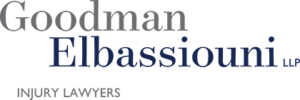When you’re injured on another person’s property, you may be eligible to file an occupiers’ liability claim. This right is stipulated by Ontario’s Occupiers’ Liability Act (OLA), which sets out the obligations that property owners have to keep their premises safe for visitors.
Slips, trips, and falls can occur in a variety of locations. From retail stores to apartment hallways and icy entrances or broken steps, there are many dangers that could be present on another person’s property. When the owner or manager of that property fails to take reasonable steps to address hazards, they can be held liable for resulting injuries and losses via occupiers’ liability.
At Goodman Elbassiouni LLP, our slip and fall lawyers help victims injured on other people’s property pursue compensation for damages they have incurred. To discuss your situation and your potential for a viable legal claim, call our Toronto office at 905-265-1005 or contact us online.
What is Occupiers’ Liability?
The OLA sets a duty of care for those who control or possess premises to keep visitors reasonably safe “in all circumstances”. An occupier may refer to owners, tenants, property managers, and anyone else with control over the property. Multiple occupiers can share responsibility for maintaining safety on premises. Any occupier who fails to comply with standards set out in the OLA may be held liable for resulting injuries.
“Reasonable care,” or an occupier’s “duty of care,” may be complied with in a variety of ways. For example, property owners should fix hazards in a reasonable amount of time or provide warnings about hazards until they are fixed. Placing wet floor signs on freshly mopped floors, salting icy entrances, and repairing broken railings are all examples of occupiers fulfilling their duty of care.
Many types of individuals are protected under the OLA. Customers, guests, delivery workers, and most other visitors have the right to file a claim if a property owner’s negligence contributed to an accident. Limited protections exist for trespassers or those committing illegal acts on another person’s property.
Covered “premises” include:
- Homes
- Condos
- Common areas
- Retail stores
- Offices
- Public buildings
- Recreational lands
- Moving/portable structures
- And other locations
Key Deadlines in Ontario Occupiers’ Liability Claims
In Ontario, the Limitations Act specifies how long plaintiffs have to file a personal injury claim under the OLA. Generally, you have two years from the date of your accident to file your claim. In cases where your accident occurred on municipal property (such as sidewalks, roads, or parks), you must provide written notice to the municipality within 10 days of the accident.
In addition, if you were injured by snow or ice on private property, you must provide written notice within 60 days of the accident occurring to the occupier of the premises. You must also notify any contractors responsible for clearing ice or snow from the property.
Certain exceptions to the statute of limitations may apply in rare cases. For example, minors who are injured in Ontario may be entitled to file a claim two years after they turn 18, even if the accident happened more than two years before that. In addition, in cases of “delayed discovery,” you may be able to file a claim years or decades after the accident occurred if your losses did not become apparent until a later date.
What Compensation Can You Seek in an Ontario Occupiers’ Liability Claim?
To seek compensation through an occupier’s liability claim, you must be able to prove that:
- The defendant(s) you are suing was an occupier of the premises in question.
- The occupier failed to take reasonable steps to prevent harm or warn visitors of risks they knew or should have known about
- The occupiers’ breach of duty of care directly caused your injuries and/or accident.
- You have suffered actual injuries, losses, or damages as a result of the incident.
An experienced occupiers’ liability lawyer can help you gather evidence and documentation that demonstrates negligence on the part of the defendant. If you can successfully establish liability, you may pursue compensation for damages such as:
- Special Damages: These are calculable damages that compensate you for your monetary losses. They may include the cost of medical care, rehabilitation, out-of-pocket expenses, lost income, loss of future earning capacity, attendant care, and more.
- General Damages: These are damages for intangible losses you have suffered, such as pain and suffering, loss of enjoyment of life, and more. Your lawyer will work with economic and mental health experts to calculate a fair amount of compensation for the general damages you have sustained.
Gathering evidence like medical records, photos of the accident scene, incident reports, and witness testimony can help strengthen your claim.
Learn About Your Rights Under the Occupiers’ Liability Act Today
When it comes to occupiers’ liability claims, an experienced lawyer can be extremely helpful. At Goodman Elbassiouni LLP, our legal team will conduct a thorough investigation of your incident, collect maintenance logs, contractors’ records, and CCTV footage to construct the strongest case possible for you. We can help you navigate notice and limitation rules, negotiate with insurers, and prepare for litigation, when necessary.
If you or a loved one has been injured on unsafe premises, you have rights under Ontario law. To discuss your next steps and legal options, schedule a consultation with Goodman Elbassiouni LLP today.
